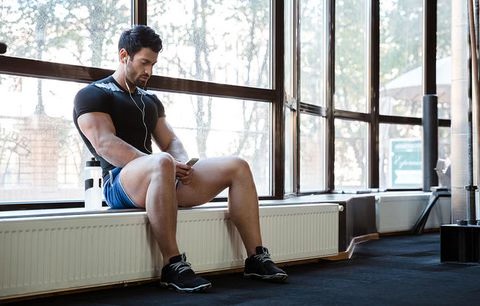By now, you’ve heard many tips on what you can do to improve the results of your gym workouts. Things like eating lots of lean protein, drinking water, and getting plenty of rest.
On the other hand, some of the things you’re doing might have the opposite effect. You could be sabotaging your fitness journey before you even take the first step.
If you’re going to put in time and effort at the gym, you might as well make the most of it by avoiding some routine mistakes! In this blog, we’ll list some of the worst things you can do before a workout at AFAC’s gym in Thornton, Colorado, and how to correct them.
Common Pre-Workout Blunders at the Gym
When you’re at the gym, you probably have your mind focused on doing everything right during your workouts. You want to use the proper form, lift the correct amount of weight, and get your heart rate to a certain point while doing cardio.
Yet no matter how hard you work to perfect your gym routine, your success hinges on what you do before and after your work out, too.
Keep reading to find out what you should avoid before your gym workout to maximize your efforts.
(1) Don’t Eat a Lot Right Before Working Out at the Gym
When you were a child, you parents might have told you to never go swimming on a full stomach because you might get a bad tummy ache.
A similar rule can be applied to working out at the gym, too. When you eat, your body directs blood flow to your digestive organs. When you exercise, your body will try to send that blood to the muscles you’re using.
This puts your digestion and muscles in competition with each other. Neither will get the blood flow needed for digestion or workout performance. This can leave you with nausea, bloating, and abdominal pain. You might even throw up.
You won’t be training at your best, therefore, if you eat a big meal too close to going to the gym. Try to finish any meal 2-3 hours before you work out.
Does that mean you should work out on an empty stomach? Not necessarily. Whether or not you eat before or after your workout can depend on a few different factors.
A small snack of some fruit (like a banana, orange, or apple), Greek yogurt with granola or dried fruit, a nutrition bar with protein, or a slice of whole-grain bread with honey can be a good way to fuel up 30 minutes before your workout. Stay away from high-fiber foods before your workout because they are digested slower, and your body can’t exercise fast enough to take advantage of the energy. Fiber also stimulates your digestive system which can affect your workout performance.
Some people prefer going to the gym on an empty stomach, and that’s fine, too, as long as their workout only lasts about an hour. Studies have shown no difference in performance between those who ate before exercise lasting less than 60 minutes and those who didn’t. Both fasted and fed one-hour cardio and strength training workouts have demonstrated similar results.
For those working out about an hour or less, therefore, it’s all up to your personal preference whether you want to have a small snack before or after your sweat session.
For exercise lasting longer than an hour, most studies show better performance when food was consumed before workouts.
(2) Skip Static Stretching Before Your Workout at the Gym
Contrary to popular belief, you should avoid static stretching (holding a stretch) before a workout. Statically stretching can decrease strength and performance when done before exercise. Studies have shown that weightlifters can’t lift as heavy and runners can’t run as fast after they engage in static stretching. Plus, holding a stretch on cold muscles can lead to strains and other injuries.
Instead, opt for dynamic, or moving, stretches before your workout. During dynamic stretching, you move through a full range of motion instead of holding a position. You can also bounce lightly into your final position. The goal is to activate your connective tissues and prepare for your gym exercises. You can also perform some light cardio to warm up your muscles and prevent injury.
Static stretching is most effective after a workout at the gym, when your muscles begin to tighten up. Stretching your muscles will help keep them flexible. You can stretch on your rest days, as well.
You don’t have to stretch at all before a workout if you don’t want to. But, if you do, go for dynamic stretching.
(3) Don’t Drink Too Much Water Before Your Gym Workout
This tip is similar to not having a big meal before your gym workout. While you should stay hydrated, you shouldn’t guzzle a bottle of water before working out. This directs blood flow to your stomach. Once you start exercising, blood will be redirected to your muscles, leading to nausea and cramps because your full stomach is deprived of blood flow. It’s better to drink small amounts of water during your workout, instead.
(4) Don’t Drink Alcohol Before Working Out at the Gym
In general, for a number of reasons, drinking alcohol is bad for those who are trying to get and stay fit.
Drinking alcohol less than 24 hours before you go to the gym can make you lethargic and unable to concentrate or hold your balance. It can also reduce the amount of control you have over your body, slow down your reaction time, and affect your coordination. That means you might do exercises incorrectly, or you might not feel how intense you’re exercising. This can make your gym exercises less effective, or worse, lead to injuries like stained muscles and tendons.
(5) Don’t Train Your Core Before a Weight Training Workout at the Gym
Your core is involved in almost every type of weightlifting exercise. If you train your abs and core before the rest of your body, it will negatively affect your performance for the rest of your workout. Leave your core and ab workouts to be completed after your strength training session, or reserve a day specifically for core training.
(6) Don’t Take Pain Relievers Before Your Workout at the Gym
Regardless of how sore you are or how sore you think you’ll be, it’s not a good idea to take ibuprofen before you work out to minimize post-workout soreness. Doing so can lead to injury because you won’t feel the pain signals that tell you you’re pushing yourself too hard. It’s better to use a foam roller for muscle soreness or wait to take a pain reliever after your workout, instead.
(7) Don’t Try a New Supplement Before Going to the Gym
Did you pick up a new supplement or sports drink that you’re excited to try? If so, don’t take it right before your workout. Wait for another time to try a small dose first and make sure it agrees with your stomach. If it doesn’t, you don’t want to find that out in the middle of your workout.
(8) Don’t Forget to Have a Plan Before You Go to the Gym
Every time you go to the gym to work out, you should think about what you want to achieve that day or have some type of plan in place to give your workout structure. By having a clear goal and plan, you’re more likely to follow through with your workout. You’ll use your time wisely and feel energized to complete your workout, instead of wandering around doing random exercises that won’t help you achieve your goals.
Instead, design a schedule and plan the types of exercises you want to perform for the week. You can come up with a split routine to target certain types of exercises on certain days, or you can target your entire body 2-3 times per week. It all depends on your schedule and fitness vision. A personal trainer at AFAC gym can work with you to construct a fitness plan that’s designed around your individual goals.
(9) Don’t Skimp on Sleep Before Your Gym Workout
If you don’t want to feel like a zombie during your next workout, then make sure to get enough sleep before you go to the gym. Sleep deprivation greatly compromises athletic performance, leading to decreased energy levels, lack of focus, reduced intensity, increased sugar cravings to boost energy, and low motivation.
While individual sleep needs vary, experts recommend that healthy adults get 7-9 hours of sleep per night. A good night’s sleep will allow your body to repair after exercise, help you build muscle more efficiently, promote the release of natural growth hormones, improve your mood, reduce stress levels, and provide energy for your gym workout. Good sleeping habits can also reduce your risk of fatigue-related injuries.
DO Go to AFAC Gym
Now that we’ve listed 9 things not to do before your workouts, let us give you one thing you definitely should do – go to Adventure Fitness Athletic Club. AFAC gym has a vast assortment of strength training and cardio equipment to choose from, as well as a packed schedule of group classes. In addition, our personal trainers are here to provide you with a long list of benefits including an individualized program that will help you reach your fitness goals. Before, during, and after workouts, AFAC gym is committed to supporting the health and wellbeing of all our gym members. That’s why we’re the best gym in Thornton, Colorado.
If you’re not a member of AFAC gym but would like more information, please stop by and speak to our team. For more information and assistance, you can also contact our gym owner, Susan, at 720-849-0245 or susan@adventurefitness.club.




